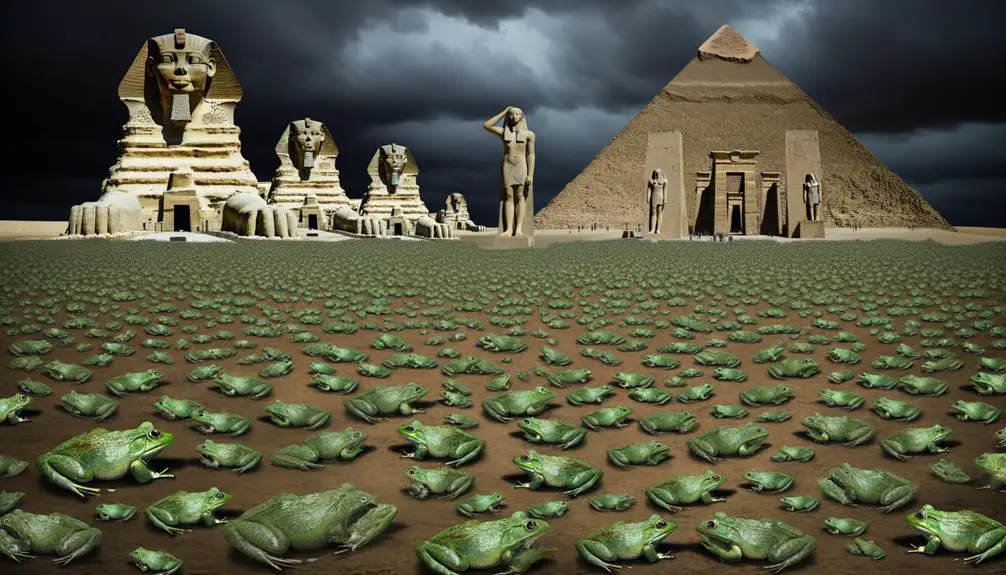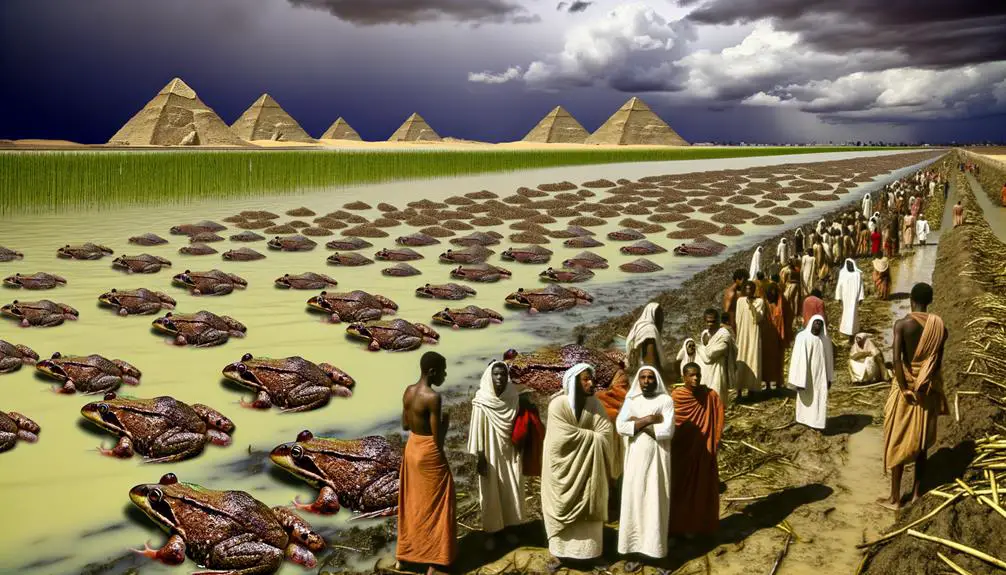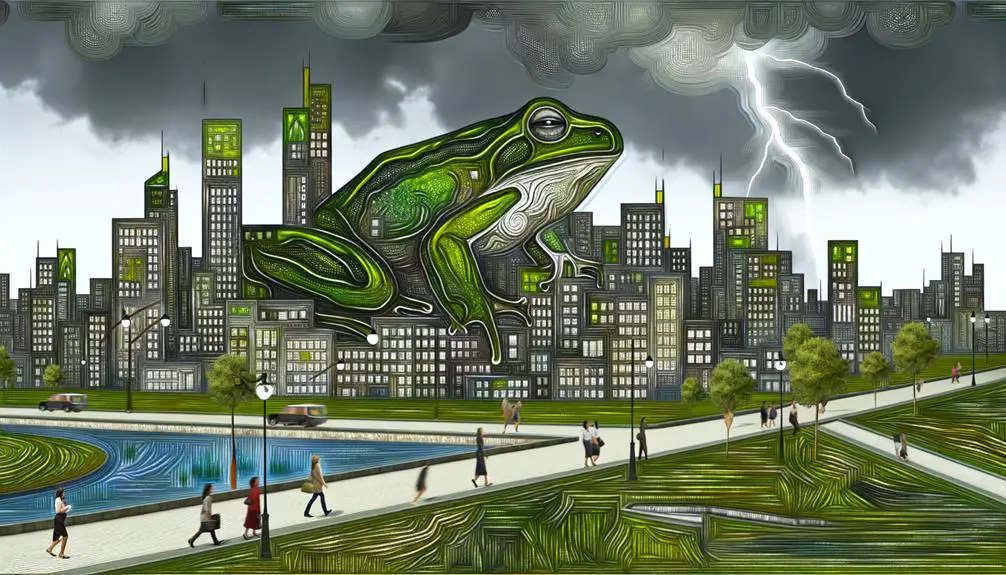Witness the Biblical plague of frogs, a divine ordeal that challenges ancient Egypt's core beliefs and disrupts its very foundations.

Frog Plague in the Bible
In the Book of Exodus, you encounter the plague of frogs, a calamitous event that struck ancient Egypt. It wasn't just a natural disturbance; it symbolized divine judgment and confronted the Egyptians' religious beliefs, particularly their reverence for Heqet, the fertility goddess associated with frogs. This plague, overflowing from the Nile, devastated the agricultural economy by interrupting the planting seasons and bringing daily life to a standstill as frogs permeated even private dwellings. The narrative, laden with ecological and spiritual crises, offers deep insights into the interplay of culture, religion, and natural phenomena. Exploring further, you'll uncover layers of meanings embedded in this ancient story.
Key Takeaways
- The plague of frogs in the Bible symbolizes divine intervention and judgment against Egypt.
- Originating from the Book of Exodus, frogs devastated Egyptian crops and economy.
- Frogs, linked to the Egyptian fertility goddess Heqet, challenged religious and cultural norms.
- The plague's narrative varies across different ancient manuscripts, yet consistently marks a significant ecological and spiritual crisis.
- Modern interpretations relate the biblical story to contemporary environmental issues, emphasizing the impact of human actions on nature.
Historical Context of the Plague

The plague of frogs, as recounted in the Book of Exodus, reflects a pivotal moment in ancient Egyptian society, deeply intertwined with the religious and socio-political dynamics of the time. You must consider how this event impacted both ancient agriculture and religious practices, integral components of Egyptian life. The inundation of frogs likely devastated crops, essential to their economy and sustenance, thereby disrupting the agricultural calendar that was closely linked to the seasonal flooding of the Nile. This agricultural turmoil would have had significant economic repercussions, given the society's reliance on crop yields not only for food but also for trade.
Moreover, the plague's assault on Egyptian religious sensibilities cannot be overstated. Frogs were associated with Heqet, the Egyptian goddess of fertility, and their sudden, overwhelming presence could have been seen as a divine omen or punishment. This event challenged the Egyptians' theological interpretations and could have led to a societal reevaluation of divine favor and protection. Understanding this, you grasp that the biblical plague was not merely a physical infestation, but a profound disruption of both the natural and divine order, weaving a complex tapestry of ecological and spiritual crisis.
Biblical Description and Sources
In Exodus, you'll find that frogs emerge not merely as pests, but as symbols deeply woven into the narrative's theological fabric, reflecting divine intervention and judgment. The second plague, as detailed in Exodus 8:1-15, involves a dramatic infestation of frogs, which serves as a stark sign of the consequences of Pharaoh's obstinacy. However, the text does not specify the exact frog species involved, leaving some room for speculation among scholars.
To enhance your understanding, consider these critical aspects:
- Textual Variations: Different ancient manuscripts show slight variations regarding the description of the plague, affecting translation accuracy. The Septuagint and the Masoretic Text may diverge concerning the intensity and scope of the plague.
- Translation Accuracy: The original Hebrew word used for 'frog' is צְפַרְדֵּעַ (tzefardea), but the exact species is unspecified. This has led to debates about whether the reference was to a common type of frog in Egypt or a more symbolic, generic term for any large number of amphibians.
- Geographical Indications: Ancient Egyptian texts and environmental studies suggest the presence of various frog species, which could survive in Nile's ecosystem, potentially aligning with the biblical account.
Each of these points deepens the narrative's complexity, reflecting on the historical and theological dimensions of the biblical text.
Symbolic Meanings of Frogs

One cannot overlook the rich symbolic meanings attributed to frogs within the biblical context, where they often represent divine retribution and chaos set free upon the obstinate. In the narrative of the plagues, frogs emerge not merely as natural disturbances but as emblematic of larger theological and moral themes. This use of frog iconography can be traced back to broader amphibian myths found in various cultures, where frogs often straddle the worlds of the earthly and the divine.
Frogs, due to their dual life in water and on land, symbolize transformation and the unforeseen consequences of sin and stubbornness. The biblical plague, hence, uses the frog's natural lifecycle to underscore a shift from divine patience to overt divine intervention. It's important to recognize this change as a pivotal moment where symbolic interpretation deepens the understanding of the text.
The manifestation of frogs, in overwhelming numbers, also serves as a divine signal, provoking reflection and repentance. In this way, the biblical text enriches the narrative by weaving complex layers of meaning into the simple appearance of frogs, transforming them from mere animals into potent symbols of warning and change. This multifaceted symbol underscores the depth of the scriptural engagement with both natural and supernatural realms.
Impact on Egyptian Society
Understanding how the plague of frogs affected Egyptian society requires examining its disruption of daily life, economic activities, and religious practices. You might find it intriguing that this biblical event wasn't just a minor inconvenience; it had profound impacts across various facets of life.
- Economic Disruption
The inundation of frogs severely disrupted the agricultural sector, the backbone of Egypt's economy. Fields and granaries became infested, leading to crop losses and a decrease in food supplies. This not only heightened food insecurity but also caused a significant downturn in the economy due to lost productivity and increased costs for pest control and crop replacement.
- Daily Life Interruption
Imagine your daily routine shattered as every corner of your home, your workplace, and the streets you walk being overrun by frogs. This scenario forced Egyptians to adapt drastically, changing their living conditions and routines to cope with the unending presence of these creatures, affecting mental well-being and societal norms.
- Religious Practices and Cultural Adaptation
The plague also challenged the religious fabric of the society. Frogs, associated with the goddess Heqet, symbolizing fertility, were suddenly a curse rather than a blessing. This paradox forced a cultural adaptation, altering perceptions and practices surrounding traditional worship and the interpretation of divine signs.
This multifaceted impact highlights the depth of disruption caused by the plague, affecting not just the physical but also the cultural landscape of ancient Egypt.
Modern Interpretations and Relevance

Today's scholars often debate the relevance of the biblical plague of frogs, considering its implications for contemporary environmental and social issues. You might find it intriguing to explore how this ancient narrative can be reflected in today's world. The story, part of a series of afflictions described in the Book of Exodus, traditionally symbolizes divine intervention in human affairs. However, modern interpretations can extend beyond theological bounds to highlight pressing environmental concerns.
Consider the environmental parallels. Just as the plague resulted in an overwhelming number of frogs, today you witness similar biological invasions that disrupt local ecosystems. These contemporary analogies aren't just limited to invasive species but also include broader environmental impacts such as pollution and climate change, which result in significant biodiversity loss. This narrative encourages you to reflect on the consequences of human actions on nature.
Furthermore, the social implications of the frog plague invite you to ponder the interconnectedness of society and nature. The story underscores how environmental disruptions can lead to profound social and economic consequences. By drawing on this ancient text, you can gain insights into current issues, fostering a deeper understanding of the intricate relationship between human activity and environmental health.
Frequently Asked Questions
How Did Ancient Egyptians Respond to the Frog Plague Initially?
Initially, you'd find that ancient Egyptians responded to the overwhelming frog infestation by seeking religious interpretations, fearing divine wrath. The economic impact was significant, disrupting daily life and agricultural productivity across the region.
Were There Any Health Risks Associated With the Frog Plague?
You'd face potential health risks from frog diseases and human allergies, particularly if environmental conditions fostered widespread frog populations, increasing direct contact and the likelihood of transmitting pathogens or triggering allergic reactions.
Did Any Other Wildlife Populations Increase During the Frog Plague?
Ever wondered if chaos breeds more chaos? During the frog plague, frog migration patterns shifted, possibly affecting other wildlife. Analyzing alternative food sources could reveal if secondary populations indeed flourished amidst the turmoil.
How Did the Frog Plague Affect the Nile River's Ecosystem?
The frog plague disrupted the Nile River's ecosystem greatly, altering frog behaviors and other aquatic life. Post-event, the ecosystem's recovery depended on the rebalancing of species and restoration of natural food chains.
Were Similar Plagues Recorded in Other Ancient Civilizations?
While you're exploring historical comparisons, consider that similar plagues were recorded in other ancient civilizations, each with unique cultural interpretations, reflecting deep-seated fears and divine attributions in their respective mythologies and scholarly records.


Sign up